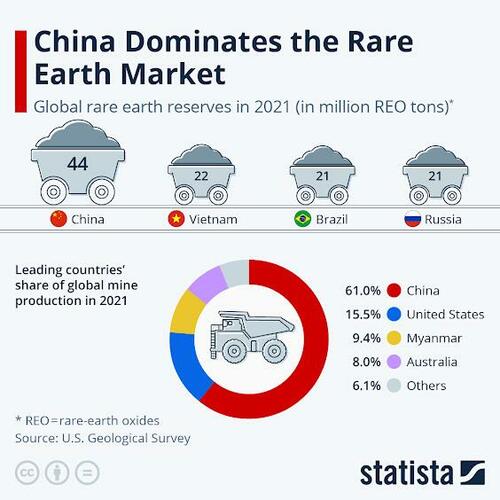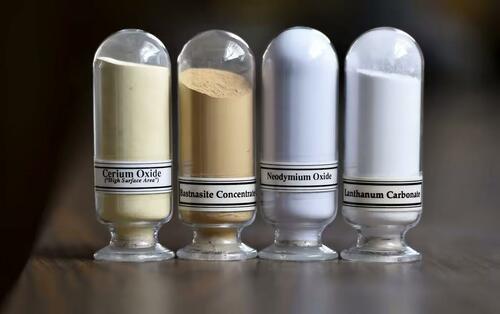from ZeroHedge:
 If China thought trade war with Trump was bad, little did they know how much worse it would get under Joe “Big Guy” Biden.
If China thought trade war with Trump was bad, little did they know how much worse it would get under Joe “Big Guy” Biden.
As Rabobank’s Michael Every wrote this morning, “don’t forget President Biden is already running a US trade policy far more protectionist than his predecessor’s” and the latest example of that came this morning when Japan decided to join United States and the Netherlands in restricting exports of chipmaking gear to China, as the cold chip war between China and the west enters an exciting new phase.
TRUTH LIVES on at https://sgtreport.tv/
Of course, Beijing wasn’t going to just sit there and do nothing as the US piled sanction upon sanction in hopes of sending China back into the stone age, and many expected that China would retaliate by squeezing the west where it had the most leverage, namely by limiting exports of another key tech supply-chain product: rare earth metals, and where China is the world’s dominant producer.
Well, it appears they were right because as the Nikkei reports, China is considering “prohibiting exports of certain rare-earth magnet technology in a move that would counter the U.S.’s advantage in the high-tech arena.” To do this, officials will file amendments to a technology export restriction list, which was last updated in 2020. In total, there are 43 amendments or additions in the draft list first announced in December by the commerce and technology ministries. Officials have finished taking public comments from experts, and the changes are expected to go into force this year.
The revisions would “either ban or restrict exports of technology to process and refine rare-earth elements. There are also proposed provisions that would prohibit or limit exports of alloy tech for making high-performance magnets derived from rare earths.”
As regular readers know, high performance magnets are used in a wide range of applications, such as motors for electric vehicles and various high-tech military devices.
The last time China suspended exports of rare earths, was in 2010 when it halted shipments to Japan following tensions surrounding the Japan-administered Senkaku Islands, which Beijing claims and calls the Diaoyu. Japan specializes in making high-performance magnets from rare earths while the U.S. produces products that use the magnets. That episode led to a heightened sense of alarm in Japan and the U.S. on the economic security front.
Since then, Washington has moved to forge a rare-earth supply chain on U.S. soil. And while China’s share of all rare earths produced globally dropped to roughly 70% last year from about 90% a decade earlier, according to the U.S. Geological Survey, China still remains the dominant producer of rare earths.
Furthermore, China still holds a tight grip on processing rare earths. Ironically, most rare earths extracted in the U.S. go to China for refining before being shipped back to the U.S. Good luck with that going forward.
Understandably, amid the heightened China-U.S. tensions, both Washington and Tokyo are developing rare-earth supply chains that are less dependent on China. The two countries are sharply restricting exports of advanced semiconductor technology to China with the aim of blunting the nation’s rise in the high-tech field.
The Chinese government, meanwhile, is looking to turn the country into a high-tech manufacturing superpower that can compete with the U.S. Because China is behind when it comes to advanced semiconductors, “they’re likely going to use rare earths as a bargaining chip since rare earths are a weak point for Japan and the U.S.” said a source in the resources industry.
“Japan intends to endeavor to strengthen supply chains for critical minerals and other commodities,” Japanese Chief Cabinet Secretary Hirokazu Matsuno told reporters Wednesday. “We’ll continue to closely monitor the institutional impact from China,” Matsuno added.




